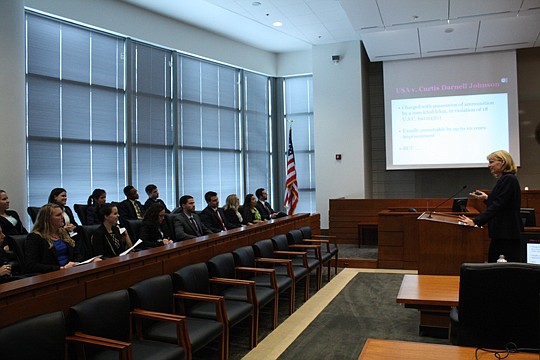
Few attorneys have their cases considered for review by the U.S. Supreme Court. Even fewer are chosen for oral argument before the court.
Area summer interns/associates were given a glimpse of the experience Thursday at the Bryan Simpson U.S. Courthouse.
“Arguing (and Winning) Before The Supreme Court” was the title of the last lunch event for the Jacksonville Chapter of the Federal Bar Association’s summer intern/associate program.
The guest speaker was U.S. Assistant Public Defender Lisa Call, who shared her experience arguing Johnson v. United States before the Supreme Court on Oct. 9, 2009.
“In the year we filed, the court received more than 8,100 petitions and heard 82 cases, so it is actually very rare to get a case to the Supreme Court,” Call said.
She said she sensed her case would overcome the slim odds to be heard by the court.
“We thought there was some interest in the case, because as soon as we filed the petition I heard from the Solicitor General telling me, ‘We are going to file a response,’” said Call.
To be considered for oral argument, at least four justices select the case as being of such importance that the Supreme Court must resolve the legal issues.
In Johnson v. United States, Curtis Darnell Johnson was convicted in a Florida federal district court for possession of ammunition by a convicted felon.
He was sentenced under the Armed Career Criminal Act because the district court determined his three earlier convictions constituted “violent felonies.”
Johnson appealed, arguing one of his convictions was for battery and the Florida Supreme Court had held the Florida battery law did not constitute a “violent felony,” according to The Oyez Project at Chicago-Kent College of Law, a multimedia archive devoted to the U.S. Supreme Court.
On appeal, the U.S. Court of Appeals for the 11th Circuit held that Johnson’s prior battery conviction under Florida law constituted a “violent felony” under the act.
The court reasoned that the force requirement of the definition for a “violent felony” was satisfied by the “touching or striking” element under the state battery law.
Call’s petition for writ of certiorari filed with the Supreme Court was granted Feb. 23, 2009, and she was scheduled for oral argument Oct. 6.
During an argument week, the justices meet in a private conference — closed even to staff — to discuss the cases and to take a preliminary vote on each case.
If the chief justice is in the majority on a case decision, he decides who will write the opinion. He can decide to write it himself or he can assign the duty to any other justice in the majority. If the chief justice is in the minority, the justice in the majority who has the most seniority assumes the assignment duty.
Call participated in several moot courts to prepare for the argument at the Supreme Court, with stops at Northwestern University, Stanford University and Georgetown University.
She visited the court before her oral argument to gain a sense of the flow of the proceedings.
“That was a good idea because I was a little starstruck the first time I saw the justices enter the room, so I got that out of the way,” said Call.
The Supreme Court reversed the decision of the U.S. Court of Appeals for the 11th Circuit by a 7-2 vote, with Justices Samuel Alito and Clarence Thomas dissenting.
“This was a great program for our summer interns/associates. You don’t often get the chance to hear from someone who has argued in front of the Supreme Court,” said Debbie Lee-Clark, organizer of the event and law clerk to U.S. Magistrate Judge Thomas Morris.
@photojoe71
(904) 356-2466